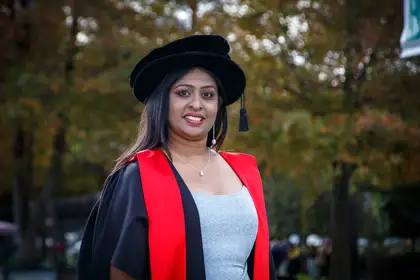
Dr Shashi Ekanayake
Dr Shashi Ekanayake began her PhD journey when she was 28. She set out to improve our understanding of the impact that lameness has on cows’ productivity, particularly on their reproduction and milk production.
Dr Ekanayake’s research was able fill the knowledge gap regarding the association between locomotion score and reproductive performance and milk production in New Zealand and Sri Lankan dairy cows. The project was able to enhance understanding of the impact of lameness on productivity in two different management systems: pasture-based seasonally calving dairy cattle in developed country and non-seasonal housed cattle in a developing dairy nation.
This understanding could increase the motivation of the dairy community in both countries to implement better lameness control programmes/strategies on farms.
Identifying the hoof lesions present in lame and non-lame cows allowed farmers and veterinarians in Sri Lanka to understand the lesions that are present on-farm and to identify appropriate interventions.
“My findings also demonstrate that we need to think more closely about the timing and targeting of lameness treatment and that we need to better understand why cows do or do not move from having mildly altered gait to clinical lameness,” Dr Ekanayake says.
She says her motivation for undertaking this research came from experiences she had in Sri Lanka as a child.
“When I was young, there were a few small dairy farms in my village. Every day, I saw cows walking from their farms to grazing sites. I noticed some cows were struggling to walk and the farmer would constantly beat them to walk forward. I saw how much those cows were suffering. Those experiences made me determined to do something for these poor cows when I grew up.”
Her research is the first study of its kind in Sri Lanka. It is also one of the first studies evaluating hoof horn haemorrhage scores in lame and non-lame cows in a dairy herd, rather than in a research intervention.
Dr Ekanayake says she would like to start her career as a lecturer, adviser or post-doctoral researcher in animal science.
“As I have several years’ experience in teaching, conducting scientific research and working with a range of people in the animal science field, I have a passion to share my expertise and at the same time continue to learn within my field and beyond to enhance my knowledge and develop my skillset.”
Shortly after completing her PhD, Dr Ekanayake got married to husband Amila Premaratne.
“My husband Amila is a very loving and caring person who always motivates and supports me. I’m also so lucky to have my lovely family, especially my parents, brother and very good friends, support me through my studies and my whole life.”
“I would like to thank my great PhD supervisors Professor Richard Laven, Dr Linda Laven, Dr Kristina Muller, Professor Jon Huxley and Professor Anil Pushpakumara who always helped me and supported me throughout my PhD journey.”